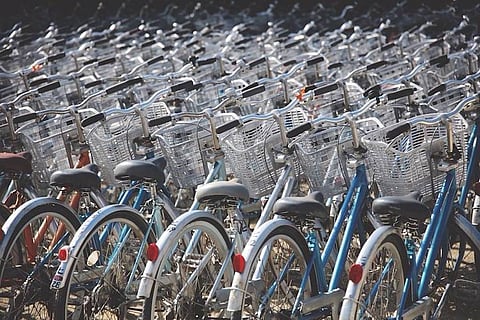

With COVID-19 making people weary over the use of public transport, the Greater Chennai Corporation (GCC) has decided to use this as an opportunity to push people to switch to bicycling. The urban governing body is planning to deploy around 5,000 bicycles across the city in an attempt to encourage people to use cycles more.
The Ministry of Housing and Urban Affairs recently issued an advisory to all states and union territories on June 2 around urban transport services in view of the COVID-19 pandemic. The document provides short, medium and long-term advisories to “make new interventions to provide people a safe, technology driven, self-reliant and less polluting urban transit system.” The short-term strategy shall be adopted within six months while the medium-term pointers should be adopted by one year. The long-term plans shall be implemented within a period of 1-3 years by the respective state or union territory or city.
The advisory also discusses the steps needed to restart public transport systems in urban areas in the country, specifically regarding the impact caused by COVID-19 pandemic. This includes encouraging non-motorised modes of transport (NMT) and touchless payment options using UPI apps.
Chennai adopted the NMT Policy in 2014 with an aim to boost walking and cycling in the city and to create safe spaces and infrastructure, including footpaths and cycle tracks. In fact, recently, the GCC under its Smart City project inaugurated a Pedestrian Plaza in the busy Pondy Bazaar in T Nagar as part of its effort to encourage NMT. The plaza is a part of the GCC’s efforts to construct a wide footpath on the sides of the busy road to help citizens walk and shop.
Several countries around the world have taken initiatives to promote NMT in light of the pandemic. For example, Italy has converted 22 miles of streets in Milan to cycle lanes while New Zealand has added 17 kilometres of temporary bike lanes to promote use of bicycles.
According to Aswathy Dilip, Senior Programme Manager, ITDP India Programme, a major share of commuting in Chennai is either by walking, cycling or by public transport facilities such as buses or metro rail. She said that the lockdown has restricted movement of many commuters due to non-availability of public transport systems and the fear of contracting the infection.
“Reduced public transport operations during the lockdown have hindered the movement of many commuters, especially the vulnerable. It is important to identify and promote an affordable and sustainable mode of transport to ensure access for all. Cycling is an effective alternative for short and medium trips to reduce strain on public transport,” she said.
As a part of the Smart City project, around 1,000 bicycles were deployed across 50 locations in the city. However, with the new advisory in place, the Corporation has plans to expand the area in which bicycles are deployed and made available for use.
Speaking to TNM, a senior officer of the Greater Chennai Corporation said, “We are gearing up to deploy around 5,000 bicycles in the coming two-three months to encourage people to use cycles to move around.”
Adding that this would mean a significant increase in the number of drop-off points for the cycles, the officer said, “We are planning to have 10 bicycles in every location, thus Chennai will have around 500 spots with cycles available for use. I agree that there is no point in having a very low number of drop-off points in the city since the people will not find it useful.”
The lack of options in NMT when it comes to catering to the needs of persons with disabilities has been a point of bother among those with disabilities.
Smitha Sadasivan from the Disability Rights Alliance, told TNM that though suggestions were presented to the GCC earlier, it did not progress any further. “When GCC started talking about the Smart City project and smart bikes, disability groups suggested that the smart bikes or bicycles need to be accessible as well. They agreed at that juncture but after that no conversation happened about accessible transport systems as part of the Smart City project,” she said.
Adding that it was a matter of following universal design in infrastructural support and in the equipment as mandated by the convention on the rights of persons with disabilities, Smitha said that the right way to go about this would be to involve the primary stakeholders in the discussion from the initial stages of planning.